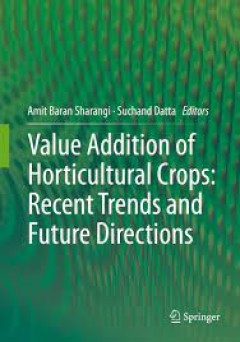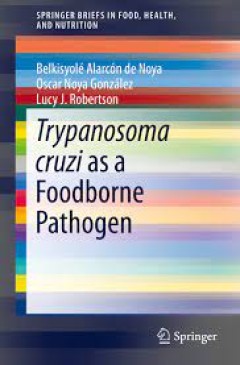Filter by

Value Addition of Horticultural Crops: Recent Trends and Future Directions
This book combines several ideas and philosophies and provides a detailed discussion on the value addition of fruits, vegetables, spices, plantation crops, floricultural crops and in forestry. Separate chapters address the packaging, preservation, drying, dehydration, total quality management and supply chain management of horticultural crops. The book explains value addition as a process of in…
- Edition
- -
- ISBN/ISSN
- 978-81-322-2262-0
- Collation
- -
- Series Title
- -
- Call Number
- -

Live, Die, Buy, Eat
Live, Die, Buy, Eat. These words represent a chain of events which today is disconnected. In the past few years, controversies around meat have arisen around industrialization and globalization of meat production, often pivoting around health, environmental issues, and animal welfare. Although meat increasingly figures as a problem, most consumers’ knowledge of animal husbandry and meat produ…
- Edition
- -
- ISBN/ISSN
- -
- Collation
- -
- Series Title
- -
- Call Number
- -

Live, Die, Buy, Eat
ABSTRACT Live, Die, Buy, Eat. These words represent a chain of events which today is disconnected. In the past few years, controversies around meat have arisen around industrialization and globalization of meat production, often pivoting around health, environmental issues, and animal welfare. Although meat increasingly figures as a problem, most consumers’ knowledge of animal husbandry and …
- Edition
- -
- ISBN/ISSN
- 9781315564609
- Collation
- -
- Series Title
- -
- Call Number
- -

True Cost Accounting for Food: Balancing the Scale
This book explains how True Cost Accounting is an effective tool we can use to address the pervasive imbalance in our food system. Calls are coming from all quarters that the food system is broken and needs a radical transformation. A system that feeds many yet continues to create both extreme hunger and diet-related diseases, and one which has significant environmental impacts, is not serving …
- Edition
- Ed. 1
- ISBN/ISSN
- 9781000389968, 9780367506858
- Collation
- 288
- Series Title
- Routledge Studies in Food, Society and the Environment
- Call Number
- 338.1 TRU t

Chapter 2 Heritage and food history
Food Heritage and Nationalism in Europe contends that food is a fundamental element of heritage, and a particularly important one in times of crisis. Arguing that food, taste, cuisine and gastronomy are crucial markers of identity that are inherently connected to constructions of place, tradition and the past, the book demonstrates how they play a role in intangible, as well as tangible, herita…
- Edition
- -
- ISBN/ISSN
- -
- Collation
- Pages 16
- Series Title
- -
- Call Number
- 642 FIO c

High Pressure Fluid Technology for Green Food Processing
The aim of this book is to present the fundamentals of high pressure technologies from the perspective of mass transfer phenomena and thermodynamic considerations. Novel food applications are exposed and their relation to chemical analysis, extraction, reaction and particle formation processes are outlined. The chapters are written by a diverse group of scientists with expertise in chemistry, f…
- Edition
- 1
- ISBN/ISSN
- 978-3-319-10610-6
- Collation
- X, 517
- Series Title
- Food Engineering Series
- Call Number
- 574 HIG

Nordic Nutrition Recommendations 2012 Integrating nutrition and physical act…
The Nordic countries have collaborated in setting guidelines for dietary composition and recommended intakes of nutrients for several decades through the joint publication of the Nordic Nutrition Recommendations (NNR). This 5th edition, the NNR 2012, gives Dietary Reference Values (DRVs) for nutrients, and compared with earlier editions more emphasis has been put on evaluating the scientific ev…
- Edition
- -
- ISBN/ISSN
- 9789289326704
- Collation
- -
- Series Title
- -
- Call Number
- -

Regulatory Foundations for the Food Protection Professional
Regulatory Foundations for the Food Protection Professional is a comprehensive guide for the entry-level food protection professional (FPP) working in either the public or private sector. The book can also serve as a foundation for students in academic programs preparing for a career in food protection. Additionally, as the Food Safety Modernization Act (FSMA) is implemented, this book will pro…
- Edition
- -
- ISBN/ISSN
- -
- Collation
- -
- Series Title
- -
- Call Number
- -

Postharvest Quality Assurance of Fruits: Practical Approaches for Developing …
This book presents a comprehensive study of the handling of fresh fruits in the developing world from harvesting to the shelf. With annual losses ranging from 30-40% due to lack of knowledge on proper handling practices and value addition, this book's information on postharvest handling and quality testing is crucial for reducing these losses and improving the quality and safety of fresh fruits…
- Edition
- 1
- ISBN/ISSN
- 978-3-319-21197-8
- Collation
- XX, 265
- Series Title
- -
- Call Number
- 634 AHM p

Trypanosoma cruzi as a Foodborne Pathogen
This Brief provides a comprehensive overview of Trypanosoma cruzi, a parasite that is traditionally considered as exclusively vectorborne, but can be foodborne, and may lead to outbreaks of Chagas disease in consumers. The characteristics of Trypanosoma cruzi and the clinical effects of the disease are covered, including documented outbreaks, regional patterns, and epidemiology. The various tra…
- Edition
- -
- ISBN/ISSN
- 978-3-319-23410-6
- Collation
- -
- Series Title
- -
- Call Number
- -
 Computer Science, Information & General Works
Computer Science, Information & General Works  Philosophy & Psychology
Philosophy & Psychology  Religion
Religion  Social Sciences
Social Sciences  Language
Language  Pure Science
Pure Science  Applied Sciences
Applied Sciences  Art & Recreation
Art & Recreation  Literature
Literature  History & Geography
History & Geography